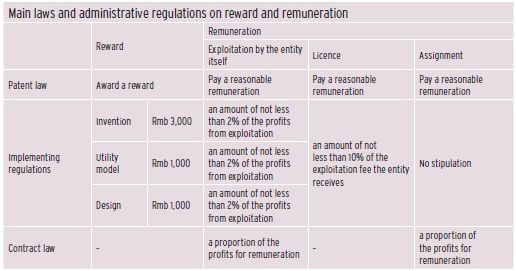China implemented the amendments to the Patent Law in October 2009 and the amendments to the Implementing Regulations of the Patent Law in February 2010. Accordingly, amended stipulations on the service invention-creation also came into effect meaning that enterprises, including foreign-funded enterprises, established within China are to reformulate the countermeasures to the service invention-creation system.
Ownership of the service invention
Article 6 of the Patent Law sets forth the following stipulations as to the ownership of the service invention-creation:
An invention-creation, made by a person in execution of the tasks of the entity to which he belongs, or made by him mainly by using the material and technical means of the entity is a service invention-creation. For a service invention-creation, the right to apply for a patent belongs to the entity. After the application is approved, the entity shall be the patentee.
For a non-service invention-creation, the right to apply for a patent belongs to the inventor or creator. After the application is approved, the inventor or creator shall be the patentee.
In respect of an invention-creation made by a person using the material and technical means of an entity to which he belongs, where the entity and the inventor or creator have entered into a contract in which the right to apply for and own a patent is provided for, such provisions shall apply.
The definition of "[a]n invention-creation made by a person in execution of the tasks of the entity to which he belongs" is prescribed in rule 12 of the Implementing Regulations. As stated in article 6(1) of the Patent Law, in China, both the invention-creation made by a person in execution of the tasks of the entity to which he belongs, and the invention-creation made by him mainly by using the material and technical means of the entity, conform to "a service invention-creation". Additionally, in China, the right to apply for a patent for a service invention-creation belongs to the entity rather than the inventor.
It is also stipulated in article 6(1) of the Patent Law that: "[a]n invention-creation made mainly by using the material and technical means of the entity is a service invention-creation." However, it is stipulated in article 6(3) of the Patent Law that "[i]n respect of an invention-creation made by a person using the material and technical means of an entity to which he belongs, where the entity and the inventor or creator have entered into a contract in which the right to apply for and own a patent is provided for, such provisions shall apply."
In conclusion, a literal interpretation of article 6(3) of the Patent Law is as follows: as to "an invention-creation made by a person using the material and technical means of the entity to which he belongs", where the entity and the inventor have entered into a contract in which the right to apply for and own a patent is provided for, even if the invention-creation is not made mainly by using the material and technical means of the entity (in other words, even if the invention-creation is not a service invention-creation), the entity may obtain the right to apply for a patent and the patent right through the contract. Nevertheless, there are objections to the above interpretation. Where the entity and the inventor have entered into a contract for a service invention-creation, attention should be draw to article 6(3) of the Patent Law.
Reward and remuneration of the service invention-creation
Table 1 shows the main laws and administrative regulations regarding reward and remuneration of a service invention-creation in China. The principal contents of the rewards and remunerations are prescribed in article 16 of the Patent Law. Furthermore, the specific amount of reward and remuneration is prescribed in rules 76 to 78 of the Implementing Regulations and local regulations. In addition, if a technical achievement is relevant
to a know-how rather than a patent application or patent, it should be noted that article 326 of the Contract Law, rather than the Patent Law, may apply.
Article 16 of the Patent Law sets forth the following stipulations as to reward and remuneration of the service invention-creation:
The entity that is granted a patent right shall award to the inventor or creator of a service invention-creation a reward and, upon exploitation of the patented invention-creation, shall pay the inventor or creator a reasonable remuneration based on the extent of spreading and application and the economic benefits yielded.
In accordance with article 16 of the Patent Law, the entity that is granted a patent right shall award to the inventor of a service invention-creation both a reward and a reasonable remuneration. The definition of "the inventor or creator of a service invention-creation" is the same as the meaning of the "inventor or creator" in Rule 13 of the Implementing Regulations.
Additionally, rules 76 to 78 of the Implementing Regulations have the following stipulations:
Rule 76: The entity to which a patent right is granted may, on the manner and amount of the reward and remuneration as prescribed in Article 16 of the Patent Law, enter into a contract with the inventor or creator, or provide it in its rules and regulations formulated in accordance with the laws.
The reward and remuneration awarded to the inventor or creator by any enterprise or institution shall be handled in accordance with the relevant provisions of the State on financial and accounting systems.
Rule 77: Where the entity to which a patent right is granted has not entered into a contract with the inventor or creator on the manner and amount of the reward as prescribed in Article 16 of the Patent Law, nor has the entity provided it in its rules and regulations formulated in accordance with the laws, it shall, within three months from the date of the announcement of the grant of the patent right, award to the inventor or creator of a service invention-creation a sum of money as a prize. The sum of a money prize for a patent for invention shall not be less than Rmb3,000; the sum of a money prize for a patent for a utility model or design shall not be less than Rmb1,000.
Where an invention-creation is made on the basis of an inventor's or creator's proposal adopted by the entity to which he belongs, the entity to which a patent right is granted shall award to him a money prize on favorable terms.

Rule 78: Where the entity to which a patent right is granted has not entered into a contract with the inventor or creator on the manner and amount of the remuneration as prescribed in Article 16 of the Patent Law, nor has the entity provided it in its rules and regulations in accordance with the laws, it shall, after exploiting the patent for invention-creation within the duration of the patent right, draw each year from the profits from exploitation of the invention or utility model a percentage of not less than 2%, or from the profits from exploitation of the design a percentage of not less than 0.2%, and award it to the inventor or creator as remuneration. The entity may, as an alternative, by making reference to the said percentage, award a lump sum of money to the inventor or creator as remuneration once and for all. Where any entity to which a patent right is granted authorizes any other entity or individual to exploit its patent, it shall draw from the exploitation fee it receives a percentage of not less than 10% and award it to the inventor or creator as remuneration.
The former Implementing Regulations prescribed in rules 74 to 77 that the applicable object is "the stated-owned enterprise or institution to which a patent right is granted." As to other entities, it is only mentioned in rule 77 that "[t]he provisions of this chapter may be implemented by any other Chinese entity by making reference thereto."
The amended Implementing Regulations prescribe that the applicable object is "the entity to which a patent right is granted." That is, rules 76 to 78 of the Implementing Regulations apply even to entities other than the state-owned enterprise or institution.
In addition, according to the amended stipulations, where the entity and the inventor have entered into a contract concerning the manner and amount of the reward and remuneration, such provisions shall apply: this is known as the principle of contract priority. The amount specified in rules 77 and 78 only applies in circumstances where there is no contract. Some of the local regulations enacted before 2009 do not include the principle of contract priority, and so contradict the stipulations in the amended Implementing Regulations. In accordance with article 79 of the Legislation Law, administrative regulations (the Implementing Regulations) have higher legal authority than local regulations.
Therefore, when the entity and the inventor conclude a contract, they may set an amount lower than the one specified in rules 77 and 78 of the Implementing Regulations. Nevertheless, in article 16 of the Patent Law, reward is prescribed as "award a reward", whereas remuneration is prescribed as "pay a reasonable remuneration." Regarding remuneration, it is true that the Implementing Regulations stipulate in rule 78 that the principle of contract priority applies when the entity and the staff have entered into a contract. However, if the entity and the staff are involved in a dispute over the service invention-creation, the focus of the dispute may be whether the contracted remuneration is reasonable. And so, before being set, the reasonable remuneration should be subject to a sufficient discussion in advance.
Remuneration
As to reward and remuneration, the present amended Patent Law and amended Implementing Regulations include stipulations such as the principle of contract priority, making the contract between the entity and the inventor more important. For enterprises to nip the dispute over the service invention-creation with the inventor in the bud before it gets out of hand, and by taking advantage of the present amendments to articles, it is necessary to formulate clear and reasonable regulations for the service invention-creation system on the basis of the above articles.
The content of this article is intended to provide a general guide to the subject matter. Specialist advice should be sought about your specific circumstances.


